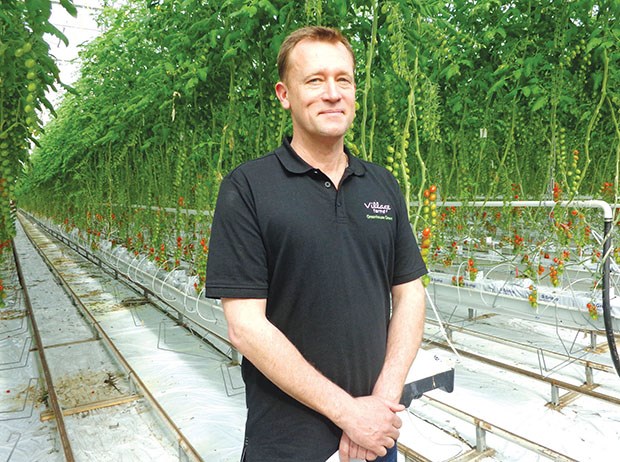Village Farms International in Ladner opened its doors to the media last Thursday.
Built in the mid-1990s and now covering over 100 acres, the large-scale greenhouse operation at the corner of Highway 10 and 80th Street is part of a company that's among the largest growers and distributors of greenhouse produce in North America, having six greenhouses and four produce-distribution centres in B.C. and Texas.
Most of the 42 greenhouses that are members of the B.C. Greenhouse Growers' Association, though, are individual family-run operations. Thursday's tour was part of a Buy Local program, which received extra funding last year from the province, and a promotional lead-up to B.C. Veggie Day on Thursday, March 20, aimed at raising consumer awareness about the B.C. greenhouse industry and its products.
A new large greenhouse operation is being built down the street from Village Farms on Highway 10, but it's the first new one in several years in Delta.
Asked why more aren't setting up shop in Delta, ideal with its flat terrain and sunny climate, Village Farms manager Dirk de Jong, whose operation grows primarily tomatoes, says it's all due to the economy, adding it can cost between $40 to 50 million to build a comparable operation.
A continuing problem comes from foreign products, especially vegetables from Mexico, said de Jong, noting most of the so-called greenhousegrown product
in that country come from open fields with a few posts holding up netting, yet are labeled as greenhouse produced. "About two years ago, a group of certified greenhouse growers in North America got started. That's because the stuff from Mexico is being sold as hydroponics, but it's a field product.
"We have food safety and biological controls, but our competition from Mexico spray. It's a big problem," he said.
"Also with Mexico, when you look at the minimum wage, they pay a dollar an hour or a dollar a day. It's wrong, but we compete with that, so it's a struggle," de Jong said.
The B.C. greenhouse industry doesn't use pesticides or genetically modified organisms, two things that should be selling points for consumers.
However, another sore point has been supermarkets placing foreign-grown produce in bins directly under large signs indicating vegetables are grown in B.C.
"The sign says B.C. grown, but when you pick up the product, because it's mandatory to say where it comes from, then you can see it's from Mexico or the U.S. People don't look at that, they just see the big sign. It's misleading to the consumer. So, that's why we're trying to promote the B.C. product," de Jong said.
Linda Delli Santi, executive director of the B.C. Greenhouse Growers' Association, said consumers are willing to pay a little more for the positive attributes of sustainable greenhouse products. She said consumers aren't aware what they're really getting from Mexico.
"We, through the national group, the Canadian Horticulture Council, have a definition of a greenhouse, and we're working with the CFIA (Canadian Food Inspection Agency) to have it embedded some how... So when you're bringing your product into the country saying it's greenhouse, it really is," she said.
According to the B.C. Greenhouse Growers' Association, the total annual farm gate sales for B.C. greenhouses was more than $199 million, while the estimated value of the sector to the province's economy is more than $600 million annually.
Employing more than 3,200 people, the greenhouse industry covers less than one per cent of all of B.C.'s farmland. According to the latest Ministry of Agriculture figures, greenhouses cover 152 hectares (375 acres) in Delta, equaling roughly two per cent of the municipality's ALR land.
To help the industry, the province a couple of years ago provided a temporary carbon tax relief grant of about 80 per cent to commercial vegetable producers, floriculture, wholesale production nurseries, as well as forest seedling nurseries.
B.C. Veggie Day activities are planned at the Vancouver Art Gallery north plaza on March 20, starting in the morning and ending about 2 p.m. For more information, check BCVeggieDay.com.



